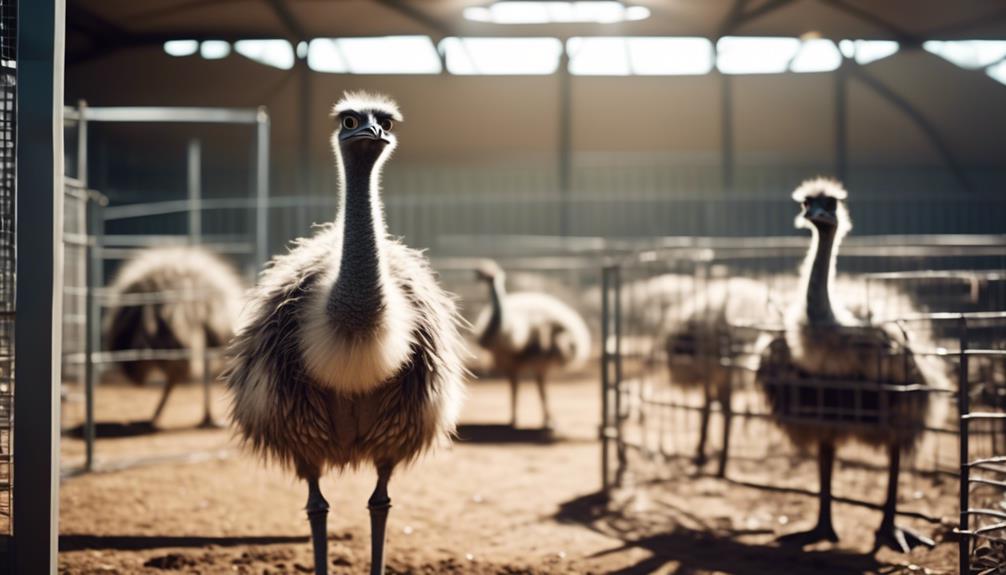
Are you considering venturing into the world of emu farming? Well, before you dive in headfirst, it is crucial that you familiarize yourself with the regulations surrounding this unique industry.
Emu farming, like any other agricultural enterprise, requires adherence to a set of guidelines and standards to ensure the welfare of the animals, protect the environment, and maintain the integrity of the market. From licensing and permits to breeding regulations and biosecurity protocols, there is a lot to understand and navigate.
In this discussion, we will shed light on some key aspects of emu farming regulations, equipping you with the knowledge you need to navigate this industry with confidence and success.
Licensing and Permits

To engage in emu farming, you must obtain the necessary licenses and permits as required by local regulatory authorities. The permit application process is an essential step in ensuring regulatory compliance and the smooth operation of your emu farm. Before applying for permits, it's crucial to familiarize yourself with the specific requirements set forth by your local regulatory authority.
The permit application process typically involves submitting detailed information about your emu farming operation, such as the number of emus you plan to keep, the size of your farm, and the facilities you have in place to ensure the welfare of the birds. Additionally, you may be required to provide information on biosecurity measures, waste management plans, and veterinary care protocols.
Regulatory compliance is of utmost importance in emu farming to protect the health and welfare of the emus, as well as to ensure environmental sustainability. By obtaining the necessary licenses and permits, you demonstrate your commitment to adhering to the regulations and standards set by the authorities.
It is essential to consult with local regulatory authorities or agricultural extension services to understand the specific requirements and processes involved in obtaining the necessary licenses and permits for your emu farming venture. By following the permit application process and maintaining regulatory compliance, you can establish a successful and sustainable emu farming operation.
Zoning and Land Use Regulations
Are you familiar with the zoning and land use regulations that apply to emu farming in your area? When it comes to starting an emu farm, understanding the land development and environmental impact regulations is crucial. These regulations are put in place to ensure that emu farms are established in appropriate areas and do not harm the environment.
Land development regulations dictate where emu farms can be located and what type of land they can be built on. These regulations vary from region to region, but generally, emu farms need to be established in rural areas away from residential zones. This is to prevent any potential conflicts with neighboring properties and to minimize disturbances to local residents.
Environmental impact regulations focus on ensuring that emu farming practices do not harm the environment. Emus are known for their large size and high food consumption, which can have an impact on the local ecosystem if not managed properly. These regulations may include guidelines on waste management, water usage, and the protection of natural habitats.
To give you a better understanding, here is a table that summarizes the zoning and land use regulations for emu farming:
| Land Use Regulation | Requirement |
|---|---|
| Location | Rural areas away from residential zones |
| Land Type | Suitable for emu farming activities |
| Distance | Adequate separation from neighboring properties |
Animal Welfare and Care Standards

Emu farming is subject to strict animal welfare and care standards to ensure the well-being of the emus and the ethical treatment of these animals. Emu nutrition management is a crucial aspect of ensuring the health and vitality of these creatures. Emus require a balanced diet that consists of a variety of foods to meet their nutritional needs. Their diet typically includes a mix of grains, such as corn and barley, as well as fresh fruits and vegetables. It's important to provide them with ample access to clean water at all times.
In addition to nutrition management, emu housing requirements are essential for their well-being. Emus need spacious and secure enclosures that allow them to move around freely. Their housing should provide protection from extreme weather conditions, such as excessive heat or cold. Adequate ventilation is also necessary to maintain air quality and prevent respiratory issues. Emus are social animals and should be housed in groups to avoid loneliness and stress.
To ensure the highest standard of care, emu farmers must regularly monitor the health of their birds. This includes routine veterinary check-ups, vaccinations, and prompt treatment of any illnesses or injuries. Emus should also have access to clean bedding, such as straw or wood shavings, to maintain hygiene and prevent infections.
Breeding and Genetic Regulations
As we move into the realm of breeding and genetic regulations in emu farming, it's imperative to establish stringent guidelines that ensure the responsible and ethical propagation of these magnificent creatures. Genetic selection plays a crucial role in the production of healthy and high-quality emus. Breeders carefully choose individuals with desirable traits, such as fast growth rate, disease resistance, and efficient feed conversion, to serve as parents for the next generation. By utilizing advanced genetic techniques, such as DNA testing and pedigree analysis, breeders can make informed decisions that optimize the overall genetic diversity and health of the emu population.
Reproductive management is another important aspect of breeding regulations in emu farming. It involves controlling the breeding process to ensure successful reproduction and the birth of healthy offspring. Breeders closely monitor the reproductive health of their emus, providing proper nutrition, maintaining appropriate breeding ratios, and observing the timing of mating to maximize fertility. Additionally, they may implement artificial insemination techniques to optimize genetic diversity and improve breeding outcomes.
To maintain the integrity of the emu gene pool, regulations may also restrict the importation and exportation of emus to prevent the introduction of diseases or genetic anomalies. These regulations aim to safeguard the long-term sustainability and health of the emu farming industry.
Health and Biosecurity Protocols

Strict health and biosecurity protocols are crucial in regulating the well-being and protection of emus in farming operations. Disease prevention and quarantine measures play a vital role in maintaining the overall health of the emu population. By implementing these protocols, farmers can effectively minimize the risk of infectious diseases and ensure the sustainability of their farms.
To give you a better understanding, here is a table outlining some key health and biosecurity protocols commonly followed in emu farming:
| Protocol | Description |
|---|---|
| Vaccinations | Regular vaccinations help protect emus against common diseases, such as avian influenza and EEE. |
| Hygiene practices | Maintaining clean and sanitized farm areas, equipment, and water sources reduces disease spread. |
| Quarantine procedures | Isolating new emus and closely monitoring them for signs of illness prevents disease transmission. |
| Biosecurity audits | Regular inspections and assessments ensure compliance with health and safety standards. |
| Pest control | Effective pest control measures help prevent the spread of diseases carried by insects and rodents. |
| Veterinary care | Regular check-ups and prompt medical attention are essential for early detection and treatment. |
| Record keeping | Maintaining detailed records of emu health, vaccinations, and treatments aids in disease management. |
Marketing and Labeling Requirements
To maintain the overall health and biosecurity of your emu farm, it's imperative that you adhere to strict marketing and labeling requirements. These requirements not only ensure the safety and quality of your products, but also help you establish a strong brand and differentiate your products in the market.
Here are three key aspects to consider when it comes to marketing and labeling your emu products:
- Branding Strategies: Developing a strong brand is essential for the success of your emu farm. Consider creating a unique and memorable brand name, logo, and tagline that reflect the values and qualities of your farm. This will help you stand out from your competitors and create a strong connection with your customers.
- Product Differentiation: Emu products can vary in terms of quality, origin, and processing methods. It's important to clearly differentiate your products from others in the market. Highlight the unique features and benefits of your emu products, such as organic certification, sustainable farming practices, or specific health benefits. This will help consumers make informed choices and increase their trust in your products.
- Labeling Requirements: Ensure that your emu products are properly labeled according to the regulations set by the authorities. This includes providing accurate and complete information about the product, such as the ingredients, nutritional values, allergen warnings, and any specific claims or certifications. Clear and transparent labeling builds trust with consumers and enables them to make informed purchasing decisions.
Recordkeeping and Reporting Obligations

Maintaining accurate and up-to-date records is a crucial responsibility for emu farmers, as it enables you to fulfill your reporting obligations and ensure compliance with regulations. Effective data management is essential for the smooth operation of your emu farming business.
By keeping detailed records, you can track important information such as the number of emus on your farm, their health status, and any treatments administered. This data can be used to monitor the overall health and well-being of your emus and identify any potential issues that may arise.
Compliance measures require you to maintain records of various aspects of your emu farming activities. This includes records of emu acquisitions, sales, and movements, as well as records of any medications or treatments administered to the emus. You should also keep records of any feed or supplements used, as well as the quantity and frequency of their use. These records aren't only necessary for compliance purposes but also serve as a valuable resource for evaluating the effectiveness of your farming practices.
To ensure the accuracy and completeness of your records, it's recommended to establish a system that allows for easy data entry and retrieval. This could include using electronic recordkeeping software or maintaining physical files organized by category. Regularly reviewing and updating your records will help you identify any discrepancies or errors promptly.
Frequently Asked Questions
Are Emus Considered Exotic Animals and Require Special Permits?
Emus, regarding exotic animals and special permits, are regulated by emu farming regulations. These regulations ensure economic viability and market demand. Emu farming requires special permits due to the unique nature of raising emus.
Are There Any Restrictions on the Number of Emus I Can Have on My Farm?
You can have as many emus on your farm as you want, but it's important to consider the profitability of emu farming. Make sure you have the necessary equipment and facilities to support your emu farming venture.
What Are the Penalties for Not Adhering to the Animal Welfare and Care Standards?
If you don't adhere to the animal welfare and care standards for emu farming, you could face penalties and legal consequences. Neglecting these standards can result in serious repercussions for the well-being of the emus and your farm.
Is There a Specific Age at Which Emus Can Be Bred?
You can start breeding emus once they reach a specific age, which is determined by the breeding requirements. It is important to adhere to these regulations to ensure the well-being of the emus.
Are There Any Specific Diseases or Health Conditions That Emus Are Prone To?
Emus are prone to various diseases and health conditions. Some common ones include avian influenza, Newcastle disease, and internal parasites. Maintaining a proper diet and regular veterinary care are essential in ensuring their well-being.
Conclusion
In conclusion, navigating the world of emu farming regulations may seem like trying to tame a tornado with one hand tied behind your back. With the plethora of licensing, zoning, animal care, breeding, health, marketing, and recordkeeping requirements, it can feel like a herculean task.
However, with a keen eye for detail and a willingness to adapt, you can conquer this regulatory maze and embark on a successful emu farming venture. Remember, the sky's the limit!




